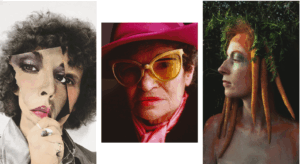
Prof. Alshaibi joins global luminaries in Bellagio residency
By: Michael Chesnick. April 29, 2024.Invited to the prestigious Rockefeller Foundation Bellagio Center residency program, University of Arizona School of Art Regents Professor Sama Alshaibi joined other top global artists, scholars and scientists tackling issues such as water and climate in addition to working on her art project that explores the impact of Iraq’s laws on women.
Since 1959, the monthlong residency program in Bellagio, Italy, has welcomed more than 4,000 luminaries from 130 countries, including 100 Nobel Laureates. This year’s cohort included Nobel Prize winner Joseph Stiglitz (United States), scientist Solomon Assefa (Ethiopia), global health expert Alaa Murabit (Libya), renowned dancer and choreographer Bijayini Satpathy (India) and novelist Gioconda Belli (Nicaragua).

Alshaibi, an Iraqi-naturalized U.S. citizen who received a 2021 Guggenheim Fellowship, was among 100 participants selected from 2,000 applications for the Bellagio program.
She was part of an interdisciplinary cohort that engaged with four Rockefeller groups that focused on climate solutions; reinventing capitalism; promoting well-being; and health, equity, innovative finance and Artificial Intelligence.
“The Bellagio Center has been privileged to host the world’s most innovative scholars, practitioners and artists who are committed to the betterment of humanity for more than 60 years,” said Natalye Paquin, Rockefeller’s chief operating officer, on the foundation’s website.
Meanwhile, Alshaibi worked on “Paratext [59/41]” — her emerging technology and text-based art project that examines Baghdad’s post-war metropolis and Iraq’s legal instruments “subjecting women and girls to devastating effect,” she said. Reflecting the influence of Iraq’s 1959 Personal Status Law and Article 41 of the Iraq Constitution on women’s rights and security, the project interrogates the country’s social norms and public life in the aftermath of the 2003 US invasion, sectarian wars, and the rise and fall of ISIL, according to her project’s abstract.
“I’ve made three trips to Iraq in the past 18 months—scanning public sites, researching archives, interviewing activists and ordinary women, and visiting fraught spaces where women and girls are trafficked or provided refuge,” Alshaibi said. “Together, we overcome barriers to tell a complex historical and evolving story of women in Iraq.”
Her multimedia installation will simulate an archive.
“I will be producing looping video and sound recordings, manuscripts, images, and constructed testimonies made from LIDAR data point clouds,” said Alshaibi, part of the school’s renowned Photography, Video & Imaging program. “Texts are extracted from data and non-literary documents concerned with the legal production of gendered inequality, including Iraq’s police logs, statistical reports, and legal writing, including the national constitution.”
For Alshaibi, the project is an intervention and a framework to comprehend Iraq’s laws and their impact on society. “Sectarianism is gendered, and controlling women’s bodies translates to control of the Iraqi people. Iraq’s women and girls have long been subjected to a gendered shadow war waged by outsiders and their fellow citizens alike,” she said. “Though today many Iraqi women are challenging political attitudes and social norms around the repression of women, the lack of official accountability for most assassinations, kidnappings, exploitation, and domestic violence places these women in extreme danger.”
“Paratext [57/41]” amphlifies how Iraqi women resist their challenges, Alshaibi said, explaining that since October 2019, Iraqis have led civil protests calling for greater rights and ending corruption by sectarian forces whose armed militias dominate the government and streets.
“Women who dare to oppose the status quo by organizing, demonstrating, and seeking legal reform are violently targeted by the authorities,” Alshaibi said. “As an Iraqi naturalized US citizen, I believe their struggles require our attention.”







